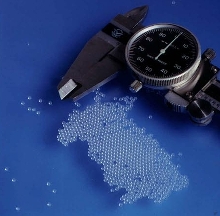Tiny Plastic Balls replace steel stampings.
Press Release Summary:
 With 1/16 in. dia, plastic balls are manufactured to precision of ±.001 in. dia tolerance with .001 in. sphericity to ensure uniform size, positioning, and feel of Braille-based sign letters. Plastic balls, engineered of acrylic for stiffness and impact strength, improve legibility for control over size, shape, height, and placement of each raised dot. They are available in smooth and textured finishes in sizes as small as 1/32 in.
With 1/16 in. dia, plastic balls are manufactured to precision of ±.001 in. dia tolerance with .001 in. sphericity to ensure uniform size, positioning, and feel of Braille-based sign letters. Plastic balls, engineered of acrylic for stiffness and impact strength, improve legibility for control over size, shape, height, and placement of each raised dot. They are available in smooth and textured finishes in sizes as small as 1/32 in.Original Press Release:
Tiny Plastic Balls Replace Steel Stampings to Ensure Uniform Size and Feel of Braille Signage
Proper Dot Positioning Prevents Confusion
Is It The Letter "F" Or An Exclamation Point!?
Oakland, NJ: Tiny, 1/16" diameter plastic balls from precision ball, bead and shape manufacturer Engineering Laboratories, Oakland, New Jersey, are manufactured to a high precision of ±.001 diameter tolerance with a .001" sphericity to ensure the uniform size, positioning and feel of each letter in Braille-based signage. An upgrade that replaces steel stampings, the tiny, plastic balls improve legibility and add an element of grace and sophistication to hallway, elevator, in-room, hazard-area, vending machine and other signage in prestigious hospitality and entertainment facilities such as hotels, restaurants, theaters, health clubs, museums and stadium luxury boxes.
Precision engineered of acrylic for its stiffness and impact strength, the tiny, plastic balls provide signage designers and manufacturers with improved control over the size, shape, height and placement of each raised dot, ensuring they are properly positioned and centered on the sign. "Dots that are even slightly off-center can cause significant confusion, especially among beginning Braille readers," explains Melanie Brunson, Director of Advocacy and Governmental Affairs for the American Council of the Blind (www.acb.org). "To be legible, the dots need to be crisp, round and properly set into position." Improper size and centering, for example, could cause the letter "F" to be read as an exclamation point.
Whether hotel, resort and other executives are using the high quality, tiny, plastic ball-based signage to appeal to the blind and visually impaired, for enhanced interior aesthetics or to avoid being sued under the Americans With Disabilities Act requiring such signage in public facilities is up for discussion, however, according to Ms. Brunson. "I've been in many hotels that have done Braille signage poorly and there is a real need for improvement," says Ms. Brunson, who represents more than 20,000 members. "If these plastic balls help improve sign quality and legibility then it's a positive step for the independence of the blind and visually impaired."
The tiny, solid plastic balls are available in smooth and textured finishes and in sizes as small as 1/32". In addition to enhancing the legibility and aesthetic appeal of Braille signage, the tiny, plastic balls improve the performance of capacitors, miniature bearings, computer electronics and other products.
For more information, contact Dan Mason, Engineering Laboratories, 360 West Oakland Ave., Oakland, NJ 07436, 800.941.2525; Fax 201.337.2467; ballsnbeads@earthlink.net; www.plasticballs.com.




